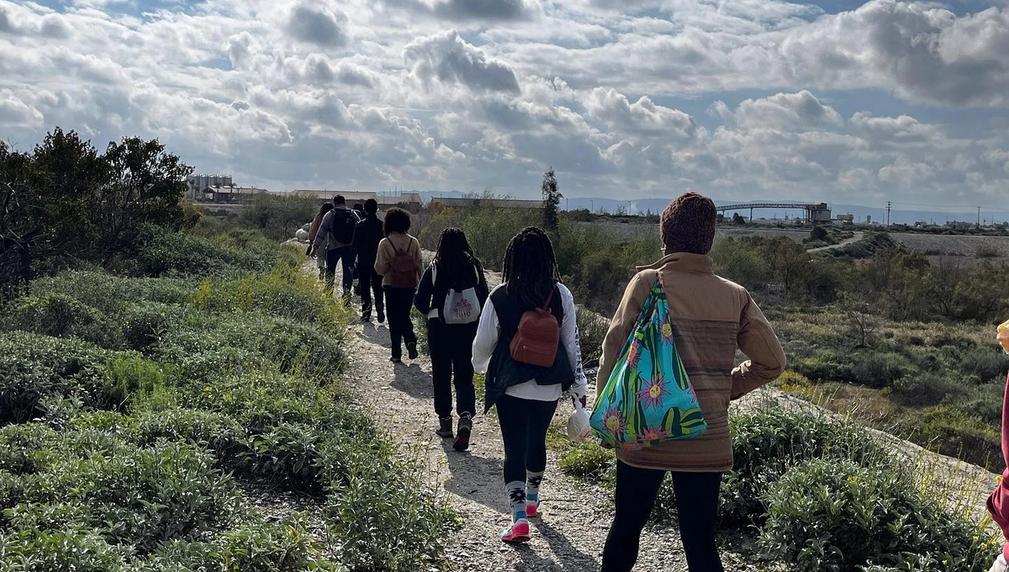Upstream Azusa Working Group
The Upstream Azusa Initiative aims to address the need for sustainable outdoor recreation and integrated land management, ensuring residents have accessible urban natural spaces and develop a deep connection to the land. The initiative will focus on expanding natural space access, creating recreational programming, cultivating resident stewards of the environment, promoting cultural appreciation of the land, and exploring economic and workforce development opportunities, all contributing to the overarching goal of violence prevention in Azusa.

What is the primary issue area that your application will impact?
Community Safety
In which areas of Los Angeles will you be directly working?
San Gabriel Valley
In what stage of innovation is this project, program, or initiative?
Pilot or new project, program, or initiative
What is your understanding of the issue that you are seeking to address?
The initiative recognizes that community safety is a critical concern and aims to address this issue through a primary prevention approach. Rather than solely focusing on reactive measures after violence occurs, the initiative aims to address the underlying causes and risk factors that contribute to violence. By working "upstream," the initiative will implement strategies and interventions that target the root causes of violence, such as addressing social inequities, promoting community cohesion, and providing opportunities for positive engagement. The initiative also aims to promote equitable access to outdoor areas, recognizing that underserved populations face barriers to accessing and benefiting from these spaces, such as economic disparities or social and cultural factors. To address these barriers, the initiative will implement strategies that ensure all residents have equal opportunities to enjoy and benefit from outdoor spaces regardless of their background or circumstances.
Describe the project, program, or initiative this grant will support to address the issue.
Central to the initiative is establishing the Upstream Azusa Working Group, an inclusive collaboration among stakeholders from diverse sectors united in their commitment to sustainable outdoor recreation and integrated land management. With the grant's support, the initiative will conduct comprehensive community needs assessments, delving deeply into residents' specific challenges and opportunities in accessing outdoor recreation. This thorough understanding will inform targeted strategies and interventions to address these barriers and ensure equitable access for all. Simultaneously, the working group will design and implement engaging recreational programming intricately linked to outdoor adventures. By fostering activities that promote physical health, well-being, and a sense of exploration, residents will be inspired and encouraged to actively participate in and reap the benefits of these outdoor spaces. This inclusive programming aims to enhance community engagement and create a vibrant and active outdoor recreation culture. Recognizing the immense power of engaged residents, the working group will prioritize the development of resident stewards of the environment. These individuals will be equipped with the necessary tools, resources, and support to actively contribute to the operation and maintenance of the recreational programming. Through their involvement, the stewards will develop a sense of ownership, responsibility, and pride in the community's outdoor spaces.
Describe how Los Angeles County will be different if your work is successful.
Suppose the work of the Upstream Azusa Initiative is successful. In that case, communities within the county will experience increased safety as the primary prevention approach of the initiative addresses the root causes of violence and promotes community cohesion. Reduced violence and crime rates will create safer neighborhoods and instill a sense of security for residents. Moreover, the initiative's focus on equitable access to outdoor areas and the development of recreational programming will enhance the overall well-being of Los Angeles County residents. Improved physical and mental health outcomes will result from increased access to natural spaces, opportunities for physical activity, and connections with nature. The initiative's success will also have positive environmental impacts, as integrated land management practices and the development of resident stewards promote sustainable environmental practices.
What evidence do you have that this project, program, or initiative is or will be successful, and how will you define and measure success?
The initiative places a strong emphasis on defining success through the active engagement of Azusa residents in the development of opportunities and recreational programming. The goal is to create a sense of ownership and to ensure that the initiatives truly meet the needs and aspirations of the community. To measure success, the initiative will closely monitor participation rates. By tracking the level of community involvement and active participation in the offered programs, events, and activities, the initiative can assess the extent to which residents benefit from the opportunities provided. Furthermore, the initiative will evaluate its effectiveness in creating a safer community by monitoring changes in crime rates. A decrease in crime rates, especially incidents of violence, will signify progress and suggest the potential influence of the initiative's activities in preventing and reducing such incidents.
Approximately how many people will be impacted by this project, program, or initiative?
Direct Impact: 200
Indirect Impact: 12,000
Describe the role of collaborating organizations on this project.
Partners and stakeholders will contribute their expertise and resources to its success. Serving on the working group, they will actively participate in decision-making processes, strategic planning, and collaborative efforts. These partners and stakeholders will also conduct assessments to gather valuable insights and feedback. Their perspectives will contribute to designing and implementing the initiative's programming. Additionally, they will assist in organizing and mobilizing volunteers for various initiatives, events, and community service projects. Through their collective efforts, these partners and stakeholders will contribute to the initiative's goal of enhancing community safety, promoting equitable access to outdoor areas, and fostering community well-being in Azusa.